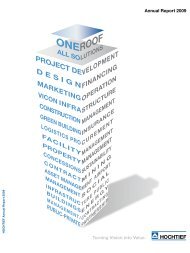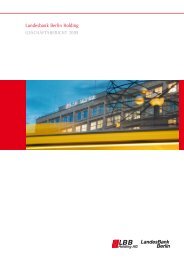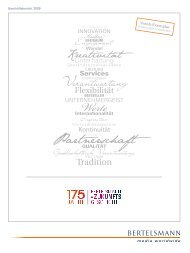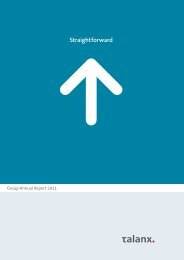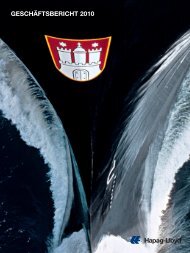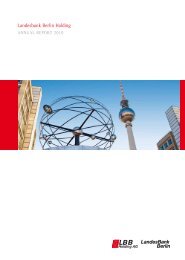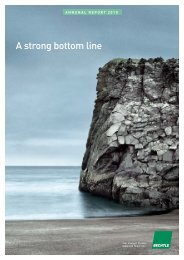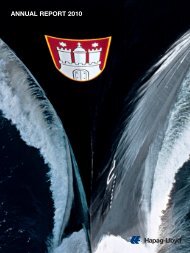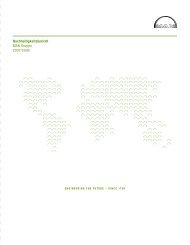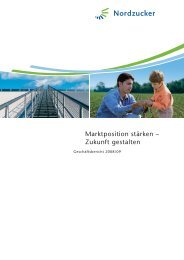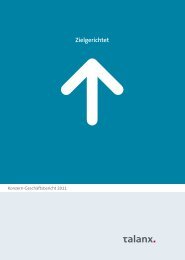Values
Values
Values
You also want an ePaper? Increase the reach of your titles
YUMPU automatically turns print PDFs into web optimized ePapers that Google loves.
Instead, the company began holding<br />
meetings with other publishing colleagues<br />
from companies such as Bauer,<br />
Burda, Springer, WAZ or the Frankfurt<br />
Allgemeine newspaper. There was<br />
enormous interest in a publishing-television<br />
project, but no one seemed to<br />
have the necessary know-how and<br />
technology for such a venture.<br />
Bertelsmann fi nally fi nds what it was<br />
looking for in Luxembourg. There, Austrian<br />
executive Helmut Thoma had been<br />
heading the German radio service of the<br />
Compagnie Luxembourgoise de Télédiffusion<br />
(CLT) since 1982. The German<br />
service fi rst hit the airwaves as “Radio<br />
Luxemburg” in 1957. During the 60s and<br />
70s, it became one of the most popular<br />
radio stations in Germany under the<br />
leadership of Frank Elstner and his team.<br />
For millions of Germans at the start of the<br />
80s, RTL was already synonymous with<br />
unconventional, diverse entertainment,<br />
thanks to Luxembourg’s “hit” station.<br />
Spurred on by the success of the radio<br />
station, Thoma wanted to get involved in<br />
the start of private television in Germany,<br />
and was also looking for a partner.<br />
There was already a connection to<br />
Bertelsmann, as RTL Radio had a cooperation<br />
agreement with the Bertelsmann<br />
book club. Meetings ensue, and then, in<br />
December 1983, a partnership is formed.<br />
Together, CLT and Bertelsmann agreed<br />
to establish a private German broadcaster.<br />
Bertelsmann took a 40 percent stake.<br />
In addition to television production<br />
technology and a tall transmitter tower<br />
from which to broadcast the pictures,<br />
CLT had two crucial advantages: a positive<br />
atmosphere and improvisational talent.<br />
Thanks to these qualities, decisions<br />
were made quickly and pragmatically.<br />
CLT was also launching a private station<br />
in the Netherlands, and was already producing<br />
TV programs for France, Belgium,<br />
and Luxembourg. Thoma decided to use<br />
the same promo trailers produced by his<br />
Dutch colleagues for the German launch<br />
– name and logo included: RTL Plus is<br />
born. Today, RTL Group, the leading<br />
European broadcasting company, continues<br />
to be based in Luxembourg.<br />
Thoma found the name “practical,”<br />
because it signaled to Germans that<br />
they would fi nd the “familiar and successful<br />
RTL Radio, plus pictures,”<br />
whether in the form of news, music, or<br />
humorous talk shows. That is how the<br />
new station started when it went on the<br />
air at 5:27 p.m. on January 2, 1984.<br />
– 20 –<br />
LOGO DEVELOPMENT<br />
The first logo is from the predecessor<br />
in Luxembourg; the logo and<br />
name of RTL Plus for the 1984<br />
launch was taken over from CLT in<br />
order to save costs. The third logo<br />
was created to coincide with the<br />
transfer from Luxembourg to<br />
Cologne. Now, the broadcaster is<br />
known by its tri-color logo, and is<br />
easily recognized by viewers.<br />
1984<br />
1984<br />
1988<br />
1992<br />
1993<br />
2004<br />
In the fi rst few minutes, it was already<br />
evident that humor will be the<br />
constant companion of the programming:<br />
dressed as a doctor, radio host<br />
Rainer Holbe was shown in the operating<br />
room, assisting at the birth of a television<br />
bearing the RTL Plus logo. The<br />
fact that the new channel chose to celebrate<br />
its broadcasting start with a<br />
cheeky grin is proof that the team<br />
wasn’t planning on following convention.<br />
In the early stages, RTL broadcast<br />
for fi ve hours, from 5:30 until 10:30<br />
p.m. A former bus garage served as a<br />
production studio. There was a group<br />
of chairs, a bar, and a news desk, but<br />
there was no money for anything else.<br />
“Our annual budget at that time<br />
wouldn’t cover a single afternoon at today’s<br />
RTL,” Jochen Pützenbacher, one<br />
of the fi rst presenters, says with a smile.<br />
At 25 million marks (12.5 million euros),<br />
the budget was modest – about a<br />
tenth of what rival Sat.1 invested in its<br />
fi rst year of operations.<br />
As RTL wasn’t available on cable in<br />
the beginning, the programs could only<br />
be seen in parts of Saarland and<br />
Rhineland-Palatinate. Only 200,000<br />
households were able to receive the<br />
station via rooftop antennae. To attract<br />
new viewers, RTL Radio started broadcasting<br />
ads, which were then shown<br />
hours later – complete with pictures –<br />
on RTL Plus. Employees produced their<br />
own live programs, played video clips,<br />
or just sat in front of the camera while<br />
playing songs.<br />
Thoma continued to pursue the<br />
unusual strategy of giving a face to an<br />
already popular radio program, which<br />
appeared to be working. Some of his radio<br />
hosts with television experience<br />
couldn’t have been happier. Rainer Holbe<br />
had already hosted ZDF’s “Starparade,”<br />
Helga Guitton was once on ZDF’s “Liederzirkus”<br />
as well as NDR’s “Aktuelle<br />
Schaubude,” and Jochen Pützenbacher<br />
had been on WDR television. “We had a<br />
lot of celebrity guests, did live talk shows,<br />
and let stars sing their hits to recorded<br />
music,” says Pützenbacher. It was risky,<br />
authentic, and went down well with<br />
viewers. The station started to attract an<br />
audience, and the program makers were<br />
having fun.<br />
When German folk/pop artist<br />
Roy Black was a guest on one of the<br />
shows, he lost a crown while singing.<br />
Laughter broke out around the studio,



